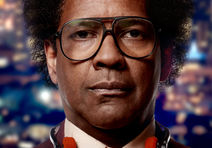

"I thought they wrote it for me," he says. He also discovered Marx and Engels' Communist Manifesto. It was there, he says, that he became "radicalized." Students had begun protesting the segregation of Ann Arbor's movie houses, and Ward found himself at the center of the movement.

Ward studied journalism at the University of Michigan. As a teenager during World War II, Ward witnessed his uncles being drafted into a war "fighting for 'freedom,' when their own country afforded them only oppression and injustice." Ward was raised in New Orleans, where he says he had "no interest" in theater but describes himself as a "precocious kid" with a passion for literature. Elnora bore Forrest a daughter, but fearing for their safety, she escaped to Louisiana. He seemed destined to play a part in America's race battles: His great-great-grandmother, Elnora, was owned as a slave by General Nathan Bedford Forrest, a founder of the Ku Klux Klan. But his voice is still loud and clear and his eyes sharp as they relive the past. An operation for tongue cancer has made it difficult for him to speak. He's now 84 and lives alone in New York's East Village. Jackson, Laurence Fishburne, Phylicia Rashad, Delroy Lindo and Angela Bassett, yet Ward is almost unknown outside of the theater world. The NEC mentored the likes of Denzel Washington, Samuel L.

"Without them," says Adams, "there really wouldn't be us today." Michael Dinwiddie, an associate professor at New York University, calls the NEC "a truly visionary company intent on mining the stories of African-American people at a time when no one was doing it." "Those are the shoulders I stand on," says Watts. Yet, for these theater activists, few can compare in significance to Douglas Turner Ward, founder of the groundbreaking Negro Ensemble Company (NEC). "And this is a story we wanted to be a part of."īoth Dixon and Adams are keenly aware of the political legacy of black theater: from Langston Hughes to Sidney Poitier, African-American theater artists have used stories to ignite sociopolitical conversation. "As artists, our job is to communicate thoughts and tell stories," says Dixon.

For Dixon and Adams, creating the performance seemed natural.


 0 kommentar(er)
0 kommentar(er)
